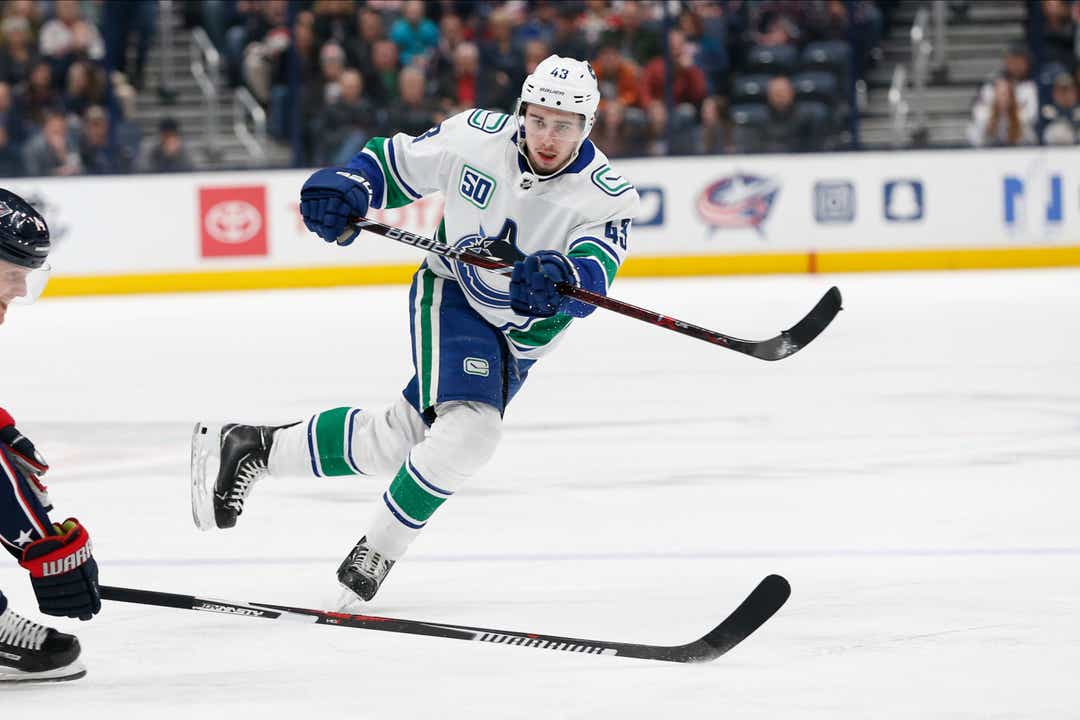Detroit – Years from now – actually, maybe months or weeks from now – NHL fans might say defenseman Quinn Hughes was the steal of the 2018 NHL Draft.
The former Michigan Wolverine and U.S. Development Team player was picked No. 7 overall by the Vancouver Canucks in that draft.
That was one pick after the Detroit Red Wings selected Filip Zadina at No. 6.

The Wings are still pleased to have Zadina — just like Buffalo is with Rasmus Dahlin (No. 1), Carolina with Andrei Svechnikov (No. 2), Montreal with Jesperi Kotkaniemi (No. 3), Ottawa with Brady Tkachuk (No. 4) and Arizona with Barrett Hayton (No. 5).
OK, maybe Montreal and Arizona have had second thoughts, only two years later, as Kotkaniemi and Hayton have have shown glimpses of being quality NHL players, but not often enough.
Dahlin, Svechnikov and Tkachuk have already made significant impacts. Zadina saw his first prolonged stretch in the NHL this season and was getting progressively better before suffering an injury.
But Hughes has been exceptional in the NHL playoffs — one of the best players in the tournament going on in Edmonton and Toronto — all at the tender age of 20.
Jordie Benn, Vancouver’s veteran defenseman, talked glowingly about Hughes Thursday during a Zoom media conference from the Edmonton bubble.
“The kid, it’s incredible to watch him,” Benn said. “I’ve played with some good players and he’s up there as one of the best I’ve ever seen. It’s just scary that we say that kid is going to get better. I don’t know how that’s possible because he’s so good already. But it’s going to be scary in a few years when he is better and older and dominating this league.”
More: Red Wings loan forward Mathias Brome to Swedish team
Until being held off the scoresheet by St. Louis in Games 4 and 5, Hughes tied the longest playoff point streak by a rookie defenseman in NHL history at six games (set by Al MacInnis in 1984 and matched by Zarley Zalapski in 1989).
Hughes’ stretch pass to Bo Horvat to win Game 2 in overtime against St. Louis has been one of the highlight-reel plays of these playoffs.
A finalist for the Calder Trophy as the NHL Rookie of the Year – and likely winner, although Colorado defenseman Cale Makar is astonishingly good as well, and a similar player – Hughes’ creativity and vision on the ice are jaw-dropping for his age.
“He’s impressive,” said Chris Tanev, Hughes’ defensive partner. “He’s going to be the best defenseman in the league next year, or the year after.
“The way he skates, the way he moves the puck. He’s a special player.”

Wings fans, or at least a growing segment of them watching these playoffs, are seeing it and not happy Hughes isn’t part of the Wings’ organization.
Certainly the Wings had plenty of chances to watch him as he played two seasons at Michigan and before that, two years at the Plymouth Township-based U.S. National Team Development Program.
In fact, Jeff Blashill coached Hughes at two men’s world championships (2018-19) and roomed Hughes with Dylan Larkin, where the two became friends.
Before the Wings faced Vancouver this season, Blashill spoke about Hughes’ improvement and his passion for hockey.
“Some of the things that maybe he wasn’t great at throughout that season going into the draft, he had already shown improvement in. Like his shot, for example,” said Blashill. “When I watched him on the ice, I saw a guy that could shoot a puck and his technique was excellent. As his strength improved his shot was going to get way better.
“I really liked Quinn when I had him (at world championships). He did a really good job for us. Could I predict he’s top-four a year later with a team that’s winning? I don’t know that you can ever predict that for certain.
“But I like a couple things about Quinn. I like he cares a ton. He loves hockey. He wants to be a hockey player, and he’s got big-time passion for hockey, and he’s willing to get better.
“So he’s willing to listen, learn and get better, so if you care a ton and you’re going to work at it and you’re willing to listen to Greener (Canucks coach Travis Green) and get better, you’re going to maximize your ability and that’s what Quinn does. I’m a big fan.”
Some scouts were hesitant about Hughes’ size (5-foot-10, 170 pounds) and defensive ability ahead of the draft, but in these playoffs Hughes has shown top-level defense because of his stick work and ability to ready plays.
Blashill felt Hughes’ gifts would make him an impactful NHL player.
“When I watched him I thought, ‘That’s a skill-set that’s transferable (to the NHL),’” Blashill said. “Some guys are really good players in college or junior, but maybe they’re not explosive enough or maybe they’re not big enough, maybe they’re not fast enough.
“His skill-set, for me, was transferable because he is super explosive. I mean, super explosive. It wasn’t explosive for college hockey, it wasn’t explosive for the world championships.
“It’s explosive with the best players in the world.”
Hughes led all NHL rookies in assists (45) and points (53) and was only three points from tying the Vancouver team record for points by a rookie defenseman before the league shut down on March 12.
Entering Friday’s Game 6 against St. Louis, Hughes has nine points (one goal, eight assists) in nine postseason games and playing as well as anyone in the NHL.
Most NHL talent evaluators judge drafts after three years. But it might already be accurate to say the six teams who passed on Hughes are kicking themselves.
“He’s going to be the best player around for a long time,” said Tanev. “We’re happy he’s on our team.”
ted.kulfan@detroitnews.com
Twitter: @tkulfan